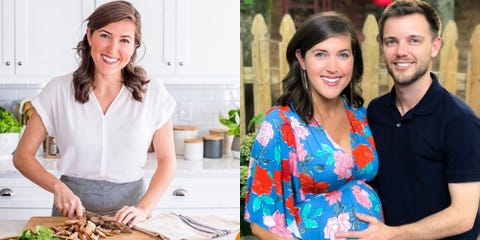‘PCOS Was Ruining My Life—Until I Cut Out Processed Foods’

Looking back, it’s pretty clear that I started having symptoms of polycystic ovary syndrome—a hormonal imbalance in women—when I was a teenager. But at the time, I had no idea that my super-irregular cycles, heavy bleeding, and breakouts had anything to do with PCOS.
My doctors weren’t too concerned, and told me what I was dealing with was normal. I started birth control when I was 16, which regulated my period and helped with the breakouts. Problem solved…I thought.
Then, about four years ago, I started having awful digestion problems (unrelated to PCOS). I had no idea what was causing my severe constipation. I had a colonoscopy, which didn’t show much, and even tried a prescription, which didn’t help. So I decided to stop taking all of my medications—birth control included—to find out if any of them were affecting my stomach.
‘That’s when all hormonal hell broke loose.’
Almost immediately after I stopped taking birth control, I got the worst acne of my life. I was always tired, and I was gaining weight despite not changing how I was eating or exercising. It took almost three months after stopping the pill to finally get my period, and after that it came without rhyme or reason—sometimes 45 days apart, sometimes 70.
This was definitely not normal, and I was ultimately diagnosed (finally) with PCOS. I knew that if I went back on the pill, these symptoms would probably stop again, like they did when I was 16. But I wanted to feel like myself, and feel good about my body, without depending on the pill.
View this post on Instagram
A post shared by Natural Living?Kate Kordsmeier (@rootandrevel) on
I went to a functional medicine doctor to see if there was anything I could do to alleviate these hormonal symptoms medication-free. I told her about how my digestion problems hadn’t improved either, and how I was still having stomach pain and constipation.
‘My doctor wanted me to totally overhaul my diet.’
She told me to limit my intake of processed carbs and sugar, and focus on eating whole foods, like fruits, vegetables, healthy fats, and lean proteins. All of these foods have anti-inflammatory effects, which we hoped would help with my PCOS symptoms (basically, the hormonal imbalance can mess with your body’s insulin, which can cause inflammation throughout the body).
The carbs and sugar I’d be cutting out, on the other hand, promote inflammation. My doctor said they may have been contributing to my fatigue, weight gain, and irregular periods. She hoped the diet would help with my digestive problems too, as eating more whole foods often does.

I decided not to restrict myself from anything completely, but I stayed away from most foods with gluten, dairy, and refined sugar in them as my functional medicine doctor recommended.
Almost immediately after I changed my diet, I had more energy than ever before. I was having regular bowel movements, for the first time since I could remember, within the first week. My skin cleared a little more slowly, but within the first year, it was completely free of breakouts. And about a year after my diet change, I was having regular periods.
‘I never feel like I’m depriving myself.’
https://www.instagram.com/p/BnR_oBghC2P/
https://www.instagram.com/p/BnR_oBghC2P/
View this post on Instagram
A post shared by Natural Living?Kate Kordsmeier (@rootandrevel) on
It wasn’t like I was just eating junk food all day before I changed up my diet. But my new focus on whole foods, rather than just calories and fat, helped me feel healthier than ever before. And it tastes good! Here’s what an average day of eating looks like for me now:
I stick to my whole-food, anti-inflammatory diet when I’m at home, but I allow myself to indulge in dishes with gluten or dairy every so often when I go out to eat.
‘Three years later, I’m still committed to this diet.’
View this post on Instagram
A post shared by Natural Living?Kate Kordsmeier (@rootandrevel) on
My new way of eating fits into my life, and I’ve stuck with it for more than three years now. I started my blog, Root + Revel, to share my experiences, tips, and recipes with other people with PCOS.
I always feared that PCOS would make it hard to get pregnant (since it can cause fertility issues). But when my husband and I started trying less than a year ago, I got pregnant on the first try. We’re expecting our first baby this month.
There is no cure for PCOS, and I’ll always have the condition. But I’m so glad I kept looking for the solutions to my symptoms on my own terms.
Kate Kordsmeier is the founder of Root + Revel, where she writes about healing through food. She’s a food and travel freelance writer based in Atlanta, Georgia.
Source: Read Full Article
